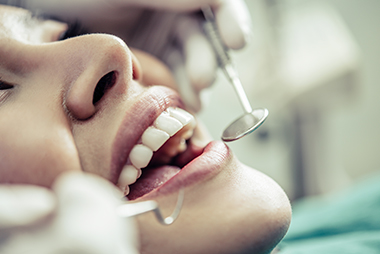Menopause is a natural process in which the female body comes back into balance.
However, changes in hormones during this period directly affect not only skin or bone structure but also oral and dental health.
Decreased estrogen hormone slows down the function of the salivary glands and causes dry mouth (xerostomia).
This can lead to problems such as tooth decay, gum recession, bad breath and taste changes.
However, a smile is the mirror of a woman's life energy.
Protecting oral health is not only about health but also about youth.
The Hidden Power of Saliva: A Little Balance, a Big Effect
Saliva is the natural protector of the mouth.
- Strengthens tooth enamel,
- It regulates acid balance,
- Prevents bad breath,
- Supports the sense of taste,
- It maintains the support that the teeth provide to the facial and lip structure.
Decreased salivation may cause tongue and tooth sensitivity, difficulty swallowing, and aesthetic losses.
This accelerates the aging effect in the lower triangle of the face.
💬 So, saliva is a fundamental element not only for oral health but also for facial aesthetics and longévité (long, youthful and quality life).
What Can Be Done for Dry Mouth During Menopause?
💧 1. Water is the Most Powerful Healing
Drinking small sips of water throughout the day increases the moisture in your mouth.
It is necessary to limit beverages such as coffee, tea and alcohol, as they reduce salivation.
🍬 2. Sugar-free gum or pastille
Chewing gum containing Xylitol stimulates the salivary glands and balances the oral flora.
🪥 3. Moisturizing Toothpastes and Mouth Gels
“Dry mouth” series products provide comfort throughout the night.
Desensitizing toothpastes are also helpful during this period.
🌸 4. Maintain Room Humidity Balance
Sleeping in dry environments increases morning dryness.
Having a room humidifier or water basin is a simple but effective solution.
🥦 5. Nutritional Support
Vitamin C, zinc, Omega-3 and coenzyme Q10 support the health of the salivary glands.
Fresh vegetables, olive oil and leafy green foods are recommended.
🩺 6. Regular Dentist Checkups
During menopause, gum health, caries control and saliva analysis should be done regularly.
Professional care preserves the aesthetic balance of the smile.
The Link Between Smile Aesthetics and Longévité
In the scientific world, the concept of “longevity” (long life and quality aging) is gaining importance every day.
Research shows that individuals with healthy mouth and teeth are not only healthier but also look younger.
Because:
- Healthy teeth support facial muscles,
- Protects lip contour,
- Keeps the smile line in its natural position,
- Provides aesthetic and functional balance.
Aesthetic dentistry (e.g. E-max laminate, composite veneers or digital smile design) can revitalize the lower triangle of the face during menopause.
🌺 Conclusion: Menopause is not the end, but a new period of balance.
Menopause is a period in which life is not stopped but reshaped.
Maintaining oral and dental health is not just about physical comfort, it is the art of protecting a woman's light.
💫 “A drop of saliva is not only the secret of the mouth, but also of youth.”
Don't postpone your smile. Menopause is a new period of balance. 🌷



 by
by